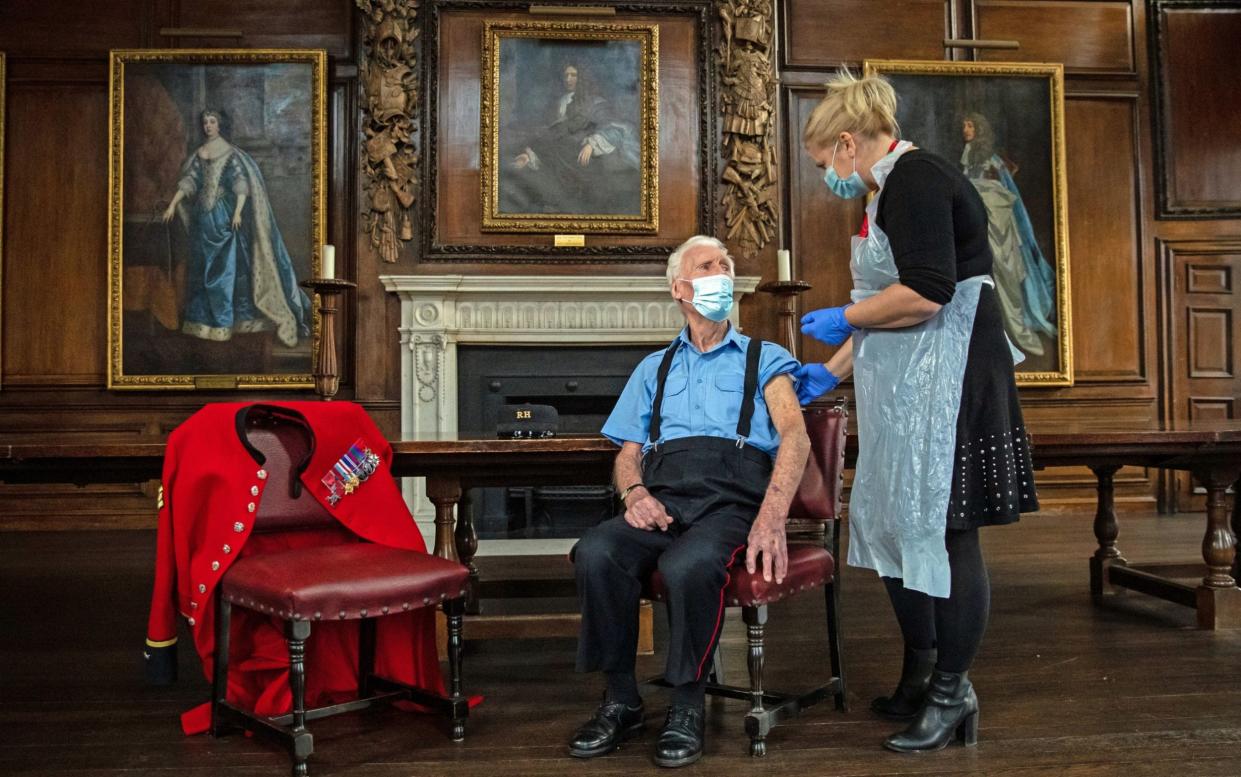Government considers plans to limit Covid vaccine to one dose per patient


The Government is considering proposals to limit people to just one dose of the Covid jab in order to allow more people to be vaccinated as quickly as possible.
Whitehall sources said "live conversations" are going on with regulators after calls for the move were made by a number of experts, including the Government's former director of immunisation.
Professor David Salisbury, who led the programme at the Department of Health until 2013, said he would "strongly urge" the Government to use the current doses available on as many risk groups as possible.
He said the new variant of the virus, which is spreading rapidly, "concerns him very greatly" and "adds even more reason" for giving people just one dose.
“I would be telling people [that if we did this] we are going to be saving more lives," Prof Salisbury told BBC Radio 4's Today programme.
The Pfizer vaccine offers up to 91 per cent protection against the virus with one dose, according to a study published in the New England Journal of Medicine, he said.
"You give one dose and you get 91 per cent protection. You give two doses and you get 95 per cent so you're only gaining four per cent," he added.
"I would use my Pfizer vaccine much more aggressively so that I vaccinated as many people as I could with one dose, as fast as I have supplies of that. And that, I think in the current circumstances, is a really important thing to think carefully about."
Leading scientists, including members of the New and Emerging Respiratory Virus Threats Advisory Group (Nervtag), which advises ministers, welcomed the idea.
Watch: Gen Z looks toward a COVID-free future
Government sources said such decisions would be made by the regulator. One said: "The authorisation was based on a two-dose regime. The question is whether there are extenuating circumstances which would allow it to be used in a way which could help us while there are constrained supplies.
"I don't think we are there yet, but there are live conversations taking place and the MHRA [Medicines and Healthcare Regulatory products Agency] are looking at it."
Experts said the decision would require approval from the Government's joint committee on vaccination and immunisation (JCVI).
The Pfizer vaccine requires two doses to be administered up to 21 days apart. So far, more than half a million doses have been given in the UK.
Prof Salisbury said it would be a "harder call" to make in relation to the Oxford AstraZeneca vaccine, which provides much lower efficacy after two doses.
Former Prime Minister Tony Blair has also called on the Government to use the first doses to vaccinate more people.
If the first dose provides more than 50 per cent effectiveness, Mr Blair said, there is a "very strong case" for "not holding back doses of the vaccine" and immunising as many people as possible until more doses are delivered.
"It's really worth digging deep to see if it's not a more sensible way of doing it," he told the BBC's Today programme. "You will get more vaccines coming on stream so you will in the end be able to give that second dose."
Writing in The Independent, Mr Blair said the current vaccination programme must be "altered and radically accelerated" and "the aim should be to vaccinate as many people as possible in the coming months".

Professor Peter Openshaw, a member of Nervtag and professor of experimental medicine at Imperial College London, said: "Any move to give just one dose of vaccines that have been tested and licenced in a two-dose regimen would be cutting across normal practice but make good sense.
"Vaccines that prove more effective than expected might logically be tested in a lower dose or in a reduced dose regimen, but the effects would need to be closely monitored.
"Moving to a single dose regimen seems a sensible tactic in terms of getting as many people as possible protected now, but the effect needs to be carefully monitored and plans put in place for later boosting of responses if necessary. For now, people should continue to follow advice from those responsible for their care."
Stephen Evans, professor of pharmacoepidemiology at the London School of Hygiene & Tropical Medicine, said: "This is not a simple question. No trials of the Pfizer/BioNTech vaccine were done using a single dose as the intended procedure, so the amount of data on efficacy of a single dose is limited."
He said US regulators suggested that there was efficacy of around 80 per cent after one dose, adding that it was not clear how long it would last because all trials involved people who got a second dose three weeks later.
"What is clear is that there is evidence of efficacy in the short term, and it seems likely that the efficacy will not decline notably," he said. "This efficacy is clearly nearer 80 per cent than 90 per cent and could be quite a bit lower, but is still good.
"There is a legal difficulty in that the Pfizer/BioNTech vaccine authorisation is for two doses 21 days apart and not for a single dose. If JCVI were to go against that authorisation it may create difficulties in legal terms, but this is a pandemic."
A Department of Health and Social Care spokesman said: "Our brilliant NHS has vaccinated more than half a million people against Covid-19 using the Pfizer/BioNTech vaccine. Over the coming weeks and months, the rate of vaccinations will increase as more doses become available and the programme continues to expand."
Watch: What is long COVID?

 Yahoo News
Yahoo News 
